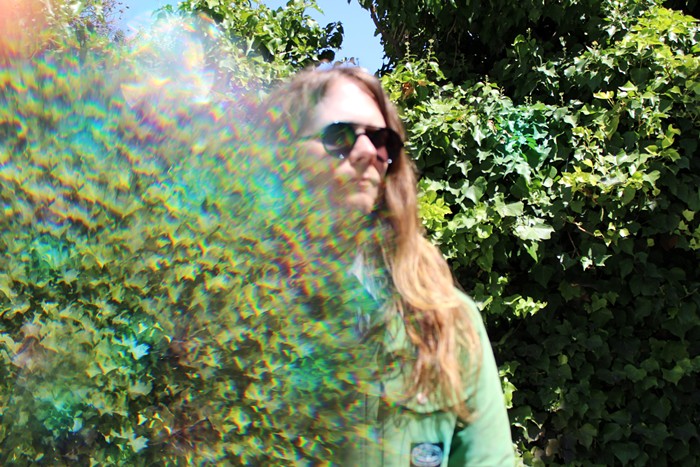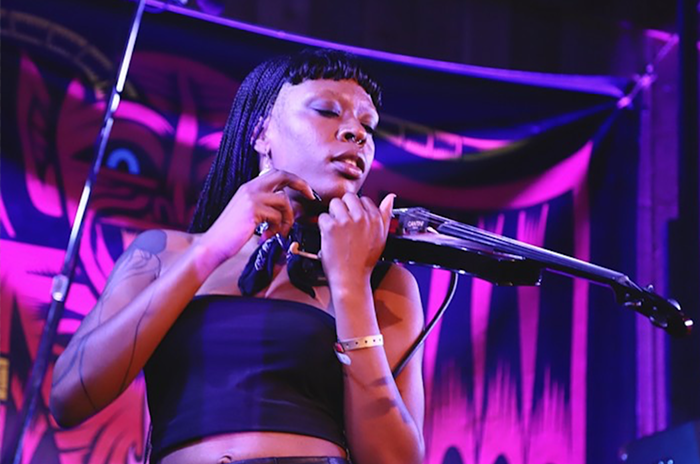
If Philadelphia songwriter Alex Giannascoli were a cult-leader, I'd drink an entire pitcher of the Kool-Aid. Giannascoli is better known by his shortened stage moniker Alex G—a reflection of his decidedly humble self-presentation. His 2014 full-length, DSU, is a collection of songs that have a way of seeping into your bones after your first (or second, or fiftieth) listen, and the subsequent re-releases of his Bandcamp LPs Trick and Rules all had some part in forming my late-adolescent/early-adult love of music. Giannascoli quickly followed up these releases with 2015’s Beach Music, his most ambitious undertaking yet. While at its core the album maintains the tender guitar-pop song structure of his earlier releases, Beach Music bathes each song in beautiful production, adding odd electronics and voice modulations. I've repeatedly listened the album to since it dropped last October, and am still baffled by the intricacies of Gianascoli’s storytelling. He has sparked comparisons to Elliott Smith: both artists recorded their uncomfortably-emotional music alone, and are shrouded in a larger-than-life mythos.
I meet Giannascoli behind the Mardi Gras, where he'd later play the last set of Boise's Treefort Music Fest's first night. An opening band wails inside, so we move into the venue’s back alley between two parked tour vans. It's so dark I can barely see his face, but he's visibly (and understandably) tired as we start talking. “We drove from Salt Lake City this morning," he says. "The first thing we did when we got here was play that show at the Record Exchange, then we chilled out a little and were about to play this one.” Giannascoli tells me about driving through a blizzard to get to Boise, without any snow tires or chains, before our conversation drifts to the topic of Beach Music. When I ask how the album's production differs from his previous releases, he hesitates.
“It’s hard for me to say, because it wasn’t made any different than the other albums, other than the fact that this one I brought to a professional to mix after I recorded it," he says. "I think that’s what gives it the higher quality sound. Other than that, I went about it the same as the other ones, just plugging away at it in my free time.”
Once we start talking about Giannascoli’s hometown of Philadelphia, his face lights up. The city’s DIY music scene is having a big moment, with bands like Sheer Mag, Girlpool, Radiator Hospital, and Cold Foamers recently receiving national recognition.
“People put a lot of effort into it, and it’s not for money or something, you know what I mean, it’s just because people love this art form,” he says. “People make, well at least made, a big effort to have DIY shit going on as much as possible. They probably still do, I’m just out of the loop at this point.”
I can’t help but think of Giannascoli’s song, “Change” (off Trick) where a despondent narrator tries to catch up with a loved one who has drifted away in life. He sings, “We love you then/It’s not the same/I don’t like how things change.” It’s a seemingly simple song, but one that's anchored in a mire of conflicting emotions. I ask if he's been able to write much while on tour.
“Not really. I think of little lines here and there, but hardly anything full,” he says. “You're either in the van or driving, then once you get to the show you have to load in, soundcheck, play, then sell merch. My brain is just really filled up all the time.”
When I ask what he’s been listening to lately, Giannascoli tells me he hasn’t been able to pick up any new CDs, but says he always gives a shout out to Brandon Can’t Dance, a Philadelphia musician he's looked up to since he was just a kid going to DIY shows. Last fall, Brandon Can’t Dance opened for Alex G at Beach Music's release show. Giannascoli smiles and quickly notes, “I would open up for him in a heartbeat.”
He gets most excited whenever Philly is mentioned in conversation. It seems like Giannascoli's still not used to the attention—he was, in some ways, thrust into the buzz-band spotlight. Only after five straight-to-Bandcamp albums did Orchid Tapes pick up his breakout LP, DSU, with Domino Records subsequently releasing Beach Music. I ask him about the prospect of new music.
“Yeah, I’ve got a lot of songs done, but I still have a lot of work to do before I call them finished. I want to make a really long album, so hopefully next year... I mean I have no fucking idea,” Giannscoli says. “[The new songs are] a lot more airy, if you know what I mean. I’m trying to think of the word for it—I’m not trying to say drone-y, but just a lot of vomit-type shit, where it’s really chaotic. There’s the song on Beach Music called 'Look Out'—that is sort of what I’ve been working a lot with, but with more traditional string instruments.”
Later that night, Giannscoli and his band opened their set with a cacophonous-screaming rendition of “Look Out,” before immediately transitioning into the silky groove of “Boy.” The show's highlights came in these moments when they broke into fully in-sync noise-jams, only to delicately shift to tender sing-alongs. There was no setlist, minimal between-song banter, and no encore. The set was straightforward, but at times marked by a disturbed emotionality. They played “Salt” stripped-down and without Beach Music’s electronic layering. Giannascoli delivered the track's lyrics with a full body’s worth of pain behind his words. The crowd, once wildly dancing during Porches' opening set, was stilted, either in awe, fear, exhaustion, or some combination of these. It's a scene I don’t think I'll ever be able to forget.


















